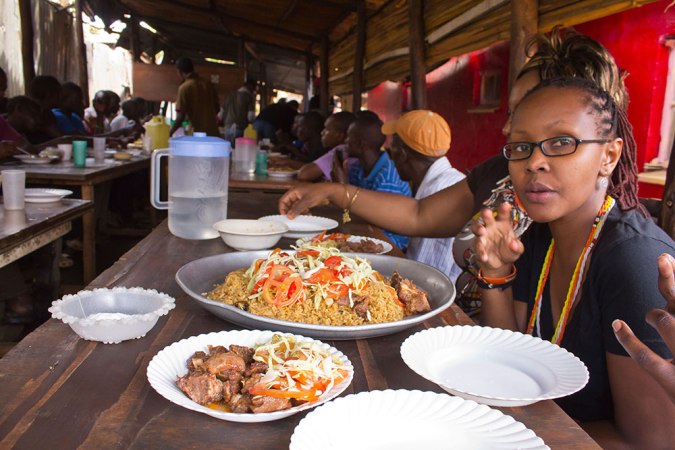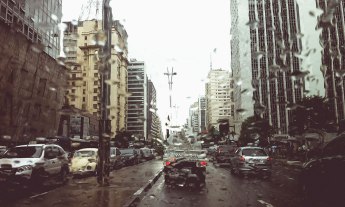
Juliana Rotich was not expecting our interview to end in tears. Neither was I. But on reflection, we were both completely okay with it. After all, that’s what happens when terrorism becomes personal.
For Rotich, that happened when al Shabaab terrorists attacked the Westgate Mall in the northwestern part of Nairobi in September 2013, killing at least 67 people and holding many others hostage for days. What for many of us was a series of terrible pictures on the television news was for Rotich a much more intimate story. She knew the mall — an upscale, modern building in a bustling part of Kenya’s capital city. It wasn’t somewhere she hung out, but it was a perfectly pleasant place to meet friends and pick up a frozen yogurt. She also knew some of the people caught up in the days’ events; a colleague’s wife and four young children had all been there when the shooting broke out, and thankfully all escaped safely.
Yet it wasn’t recounting any of these unsettling details that got to Rotich, the softly spoken, even-keeled cofounder of the nonprofit data and mapping collective Ushahidi. (Rotich is also the co-developer of Internet-enabling device BRCK, a central figure in Kenya’s technology start-up scene, as well as a TED Fellow.) What made her tear up was describing her team’s response to the events, which came in two distinct forms. First, they quickly adapted Ushahidi’s software to highlight Red Cross locations in Nairobi at which people could donate blood. Next, they designed, developed and rolled out Ping, a group check-in tool for friends and family to contact each other in time of crisis and cut down on inefficient round-robin calls when phone bandwidth is compromised.
“We didn’t meet to create another application,” Rotich said of Ping’s rapid roll-out. “We met to deal with the reality of what had happened. But this team is made up of very special people. They’re really conscientious and caring, and when they come together and they see a problem, they try to figure out a solution.” It’s at this point that her voice breaks. “I was supposed to head to New York for the Clinton Global Initiative,” she adds. “But I really didn’t want to leave Kenya. After that one meeting, I was so inspired to continue to work harder for Ushahidi and for this team that comes together when people have a problem.”
They built and rolled out Ping, a group check-in tool for friends and family to contact each other in time of crisis.
Rotich’s passion for both technology and community isn’t new. It comes across equally clearly in our other, less emotionally charged conversations, during which she unfailingly shows herself to be a deeply thoughtful observer of the African technology industry and a skeptical supporter of progress in her adopted home city. And, perhaps not surprisingly, she is an unflinching advocate for women in tech. At iHub, the innovation hub and technology incubator she both works from and advises, she actively promotes a culture that’s welcoming to all.
“I do appreciate that Kenya is still very much a patriarchal society, so sometimes you deal with condescending attitudes outside of the microcosm of the iHub. But by and large, our culture within iHub is very much one of doing and making, and everybody is part of the story.”
Her relationship with the city itself was arguably ambiguous even before the Westgate massacre. Born and raised in rural Kenya, about 50 kilometers from the western city of Eldoret, she moved to the United States to study at the University of Missouri, Kansas City, and ended up living and working in the US for more than a decade — first at Sprint Telecom in Kansas City, then later as a data analyst in Chicago. In 2011, she and her husband relocated to Nairobi. Making the city their base was, she says, a difficult decision.
“I was worried about the basics,” she says. “Would we have running water? Would we have electricity or backup power?” These are not questions you generally need to ask in the developed world, but such issues are a fact of life in Nairobi. It’s why BRCK, which can be described as a “backup generator for the internet,” is far more than just a cool toy. Reliable Internet access in Kenya is never a given.
“I was worried about the basics,” she says. “Would we have running water? Would we have electricity or backup power?”
Happily, Rotich describes experiencing a “soft landing” and finding a home in the quiet Kilimani neighborhood, located close to the iHub’s always-busy office. Both are in Nairobi’s own version of the Silicon Valley, sometimes known as the “Silicon Savannah.” (Proximity was more than just a convenience; traffic in Nairobi is a disaster, meaning that commuters can spend hours in stationary traffic during rush hour. If it rains? “Park up and find something else to do.”) Nonetheless, Rotich is still reluctant to describe herself as a Nairobian, preferring instead to refer to herself as “location-agnostic” and describing the city as “another node in my network.” In particular, she remains skeptical about some of the so-called progress in the city. “I’ve been traveling back and forth to Nairobi since 2002, and every year I would look out of the window of the plane and see more lights. Currently the pace of growth, particularly in real estate, is frenetic,” she explains. “You go down a street one day and then the next there’ll be a shiny big building there. In one sense, this is a good thing, but in another, I really wonder if we’ve thought about the kind of growth we want and need.”
For Rotich, the daughter of an architect, what’s missing in the new, tall and shiny buildings shooting up all around her are two things: a philosophy of responsible design that pays heed to the environment and its needs and abilities; and any sense of Africa. For a country that’s still asserting its identity after gaining independence from the UK in 1963, this is a problem. “Right now, the types of buildings that are coming up are not rooted in anything that tells me that this is home, this is Kenya, this is Nairobi. And that makes me feel a little bit sad,” she says. As for sustainability? Forget about it. In her opinion, Nairobi isn’t living up to its solar potential. “It’s hot out here! We’re not tapping into the fact that we have a lot of sun as well as we could.”
Then there is the other side of the city, the part the tourists don’t usually see but which nonetheless forms a critical layer of Nairobi’s urban fabric. “For each affluent suburb, there’s an accompanying slum,” says Rotich, bluntly. In other words, for every leafy neighborhood like Karen, there’s the stark contrast of Kibera, a slum that’s home to hundreds of thousands of people. (With no official census, it’s impossible to give an exact figure, but Kibera is thought to be the largest urban slum in Africa.) “Very early in the morning, you’ll see people walking all the way from home on one side of the city to work on the other.”
The next challenge for the city’s government, she says, is to tackle the slums head-on, and upgrade the housing conditions for the less well-off. But for now, this doesn’t seem to be a priority. Rotich worries that the political elite seems prepared to ignore the plight of so many fellow Africans. “If they’re really committed to [changing] inequality, changing where people live and the conditions of the environment in which they live is probably the first, most empowering thing they could do for a society.” Does she get a sense that it’s happening? “Not yet.”
Nonetheless, despite the colonial baggage, the dubious motivations of the political class and the unsustainable ambitions of the real estate developers, Rotich remains committed to life in Nairobi, at least for the time being. The general elections in 2013 exhibited far less violence and corruption than in previous years, and her team gives her hope.
“I’m happy about the network here and the work that we get to do here, and I think there’s a lot more of that to come,” she says. “I feel like this is a good place for us to continue to grow. And I’m really excited about this idea of exploring how we might create an environment for people to make more things like the BRCK or like Ushahidi. That is still a very interesting question to me, and I think this is the right place to figure out the answer.”
Check out all of Rotich’s favorite places in Nairobi in this handy annotated map. To see pictures, see this gallery of photographs shot by Joshua Wanyama. This article was published as part of our “Questions Worth Asking” series. This week’s teaser: “What makes a city feel like home?”













